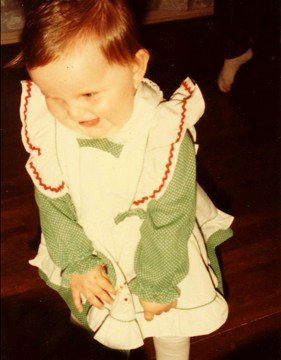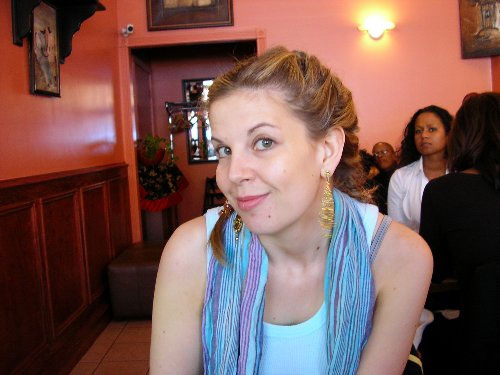
I’m a white American, so I suppose that immediately means I have this great white privilege, like I got a VIP card in the mail or something. Let me say, to start, that I absolutely believe that racism is still around. Institutionalized racism and white privilege are both very real in modern American society. I’m not denying that at all.
I’m uncomfortable being associated with white privilege, because I wasn’t born here. In fact, I’m a refugee.
I came from Poland to America as a baby. In my early days, we lived in Section 8 housing and my mother worked at a Kmart in the ghetto. It was I who taught my mother how to drive: Along with English, driving really stumped her. I had to learn the fundamentals from our teacher in English and then drive around yelling “CLUTCH!” in Polish. I also translated for my grandma when she lived with us. We went to refugee groups with the Vietnamese, and attended “poor” family activities at the YMCA.
At about seven years old, I remember riding the bus with my mother with an incredible tension inside me. My mother had taken the civil service exam and aced it. Having studied half a dozen languages growing up, she found written English far easier than spoken. Now she was going to find out if she had landed a job at the post office. In our home country she had a job as a newspaper editor, and now our only salvation was the post office.
She got it and has worked there for over 20 years now. The reliable pay and good benefits of that government job slowly pulled us out of our lives as poor immigrants. I went to Catholic school, where I was ostracized for my Nutella “chocolate sandwiches” and thrift store clothes. She eventually pushed me to go to a “fancy” private university, where I felt very out-of-place among the 98 percent very rich, very white population. I hung out with the poor kids on scholarship like me. My best friends were a black woman from Atlanta and a redneck from Mississippi.
I was hurt when my black friend started hanging out with the girls in the black sorority. They and the other minority students in my junior high and high schools got to bond in their ethnic clubs once a month.
From kindergarten through 12th grade, we spent half a year reading black history books and researching the Holocaust. To this day, I’ve only met two other Eastern European refugees. I’ve never learned in school about what happened to me and my family.
I’m white, right? I get a passing grade if not privilege.
As an adult, my skin color has allowed me to drop almost all issues of being an immigrant and of being poor, within a matter of years. I do get it: Fat people get hassled in grocery stores and restaurants because they can’t hide their weight. Black people get turned down for loans and jobs because they can’t hide their skin color. Fourth-generation Americans get pulled over by airport security for “looking like” terrorists. My Asian friends, despite saying they are from America or Canada, get asked, “But where are you from originally?”
By contrast, I tell people I wasn’t born here and “that’s right, I’m a stealth foreigner, here to take your jobs.” Sure, there’s no big “FOREIGNER” stamp on my forehead, but sometimes I want to share in that struggle with my fellow “underclass.” That’s why I live in Harlem and eat in Greenpoint.
I feel as if I spent my childhood with all the poor immigrants and at some point in my teens someone ran in and said, “Wait! Dear God, what’s a trustworthy, white American girl doing mixed in with these people?”
There are snobby, rich people in every country, but I always found it somewhat sweet that so many wealthy people in the United States are completely egalitarian. Even as they earn six figures, most “middle-class” friends of my mother and me are quick to defend the fact that they work, have only part-time cleaning services, and that their kids’ cars are used.
My fiancé’s family is fairly well-off, though I suppose they’re still middle-class by American standards. They’ve only had positive things to say about my family’s early struggles, and openly embrace the color I bring to their lives. I imagine it is taboo in their culture to consider themselves above people like me.
Still, the other day we were driving through Connecticut, and I mentioned that my cousin lived and worked there.
“Illegally?” my fiancé asked, and I murmured an affirmative. There was no judgment, just surprise. Just a bit of weight in the air between us, as my other life — the life of a poor refugee — drifted into the car and sat between us. It left quickly though.
We were a nice white couple driving through Connecticut, after all.

- Follow us on Twitter: @inthefray
- Comment on stories or like us on Facebook
- Subscribe to our free email newsletter
- Send us your writing, photography, or artwork
- Republish our Creative Commons-licensed content

